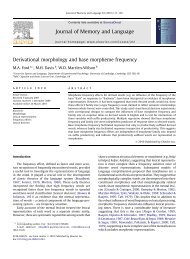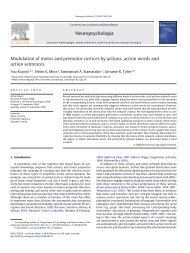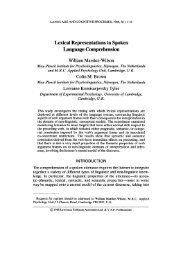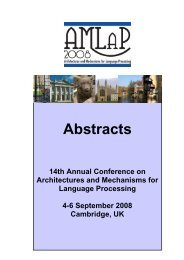Towards a psychological basis for a theory of anaphora - Centre for ...
Towards a psychological basis for a theory of anaphora - Centre for ...
Towards a psychological basis for a theory of anaphora - Centre for ...
You also want an ePaper? Increase the reach of your titles
YUMPU automatically turns print PDFs into web optimized ePapers that Google loves.
evidence, <strong>for</strong> example, that simple heuristics based on<br />
recency [S] or on gender and number matching are<br />
preferred <strong>for</strong> those cases where they are sufficient to<br />
ensure correct mapping From the perspective <strong>of</strong> our<br />
research on general speech understandinq, we would<br />
expect this not to be the case. If all processing is<br />
conducted with regard to the d iscourse-level<br />
interpretability <strong>of</strong> the consequences <strong>of</strong> these processes,<br />
then this should also apply to anaphor resolution.<br />
Heuristics based on gender and number matching may well<br />
play a role in the mapping process, but we would expect<br />
them to run concurrently with other procedures that<br />
assess the overall intelligibility <strong>of</strong> possible<br />
antecedents relative both to the discourse context and<br />
to the listener's knowledge <strong>of</strong> the world. This<br />
expectation might be contrasted with the conclusion, in<br />
some <strong>of</strong> the AI literature on anaphor resolution, that<br />
inference should be kept out <strong>of</strong> the resolution process<br />
until as late as possible, because inferencinq is<br />
expensive in time and resources, and is liable to<br />
combinatorial explosions unless the inferencing search<br />
space is highly constrained.<br />
We will return to this and other issues in the next<br />
section <strong>of</strong> the paper, which presents some <strong>of</strong> our recent<br />
experimental work on anaphor ic mapping processes dur inq<br />
speech understandinq - focussing in particular on the<br />
roles <strong>of</strong> lexical and infsrantial variables in pronoun<br />
resolution. We should stress that each <strong>of</strong> the three<br />
experiments we will describe are to be taken as strictly<br />
preliminary; in each case, they represent only the<br />
first step in a series. We report them here to<br />
illustrate some directions one could take in extending<br />
the psycholoyical <strong>basis</strong> <strong>for</strong> the study <strong>of</strong> <strong>anaphora</strong>.<br />
4. --- Some Hecent ----c-<br />
-..-- -.-----.. -- ---.C<br />
Xerimontal Studies <strong>of</strong> Anncora<br />
4.1. T ~ Q first experiment reportad hare followa<br />
directly from the issues ralaed abovej it is daalgnod<br />
to examine the time-course <strong>of</strong> anaphor resolution, given<br />
the availability or not <strong>of</strong> different sources <strong>of</strong><br />
in<strong>for</strong>mation, and to evaluate the relative salience <strong>of</strong><br />
these different sources. The major contrasts are<br />
reflected in the following stimulus set:<br />
---<br />
1) As Phflip was walking back from the shop, he saw<br />
an old woman trip and fall flat on her face,<br />
2a) He only hesitated <strong>for</strong> a moment.<br />
2b) She seemed unable to get up again.<br />
3a) Philip ran towards.. ..<br />
3b) He ran towards....<br />
3c) Running towards.. . .






